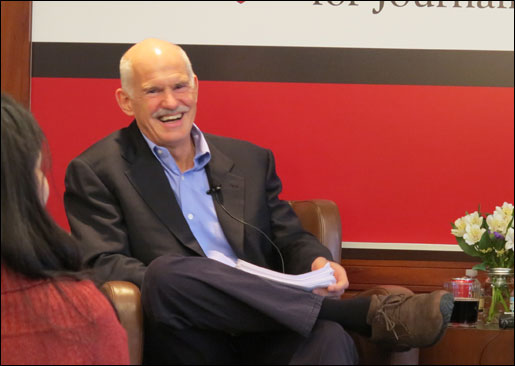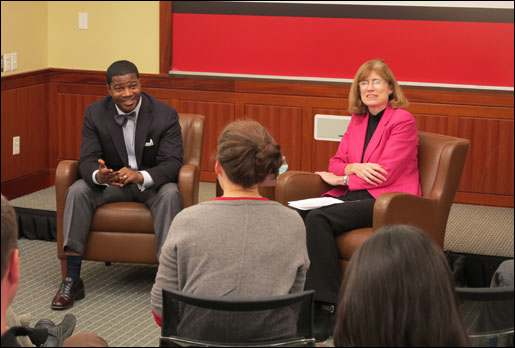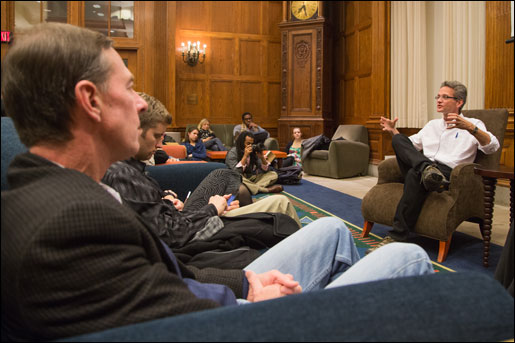Engaging Niemans
 George Papandreou, former prime minister of Greece, at a Nieman seminar
George Papandreou, former prime minister of Greece, at a Nieman seminar
What do journalists need to know, and what skills do they need to lead and succeed in challenging times? And what conversations should the Nieman Foundation initiate to bring leadership and insight to an industry in turmoil? These are just two of the questions that guide our approach to programming at Lippmann House.
As we explored individual responses to these broader issues this year—in seminars with Harvard faculty, master classes with leading journalists, internal conversations or at public events—a rich web of information, inspiration and skill building emerged.
Master classes: learning from the best
In the spring, the 2012 Nieman fellows benefitted from a new set of intensive master classes—executive versions of some of Harvard’s core leadership courses, taught by highly sought-after faculty and tailored to journalists’ needs.
Ronald Heifetz, a senior lecturer at Harvard’s Kennedy School and founder of its Center for Public Leadership, guided a one-day session on leadership. Brian Mandell, director of the Negotiation Project at the Kennedy School, brought some difficult scenarios to an all-day class on negotiation.
Instantly successful, the master class idea was expanded for the incoming Nieman fellows. Nicco Mele, adjunct lecturer in public policy at the Kennedy School, a Nieman board member and a favorite of recent Nieman classes, taught a condensed, three-session version of his oversubscribed course “Media, Politics and Power in the Digital Age” this fall.
And Deborah Hughes Hallett, a mathematician and award-winning professor with appointments at both the Kennedy School and the University of Arizona, helped fellows decipher polls and clinical-study data in a session on numbers for journalists.
In addition to these master classes, training opportunities at the Nieman Foundation currently include workshops on video storytelling, audio and photojournalism; computer-assisted reporting, basic programming and social media skills; and our ongoing, semester-long classes in both fiction writing—taught by novelist
Anne Bernays—and narrative nonfiction—taught by narrative journalist
Paige Williams.
Wednesday seminars: the world in a nutshell
Nieman seminars are a liberal arts curriculum for a diverse group of journalists: they bring contemporary issues, leaders and ideas to Lippmann House each week, and they build community and a common language among the fellows. In the spring, the 2012 class discussed gang violence and intervention programs in Chicago with Alex Kotlowitz, author and producer of the documentary “The Interruptors.” The fellows met with Tim Lenderking, director of the Office of Pakistan Affairs in the U.S. State Department; they explored social networking power with Nicholas Christakis, director of the Human Nature Lab at Harvard; they talked fiction writing with Pulitzer Prize-winning novelist Paul Harding; and they explored the aftermath of the financial crisis with Harvard economist Jeremy Stein.
In the fall, the 2013 fellows have quizzed the former prime minister of Greece, George Papandreou, about European economics; they “met” a young Barack Obama via his Harvard mentor, Law School dean Martha Minnow; they have learned how stem cell research is rocking the foundations of life from Doug Melton, Xander University Professor at Harvard and a co-director of Harvard’s Stem Cell Institute; and they have looked deeply at questions of faith and spirituality—with a multitude of world religions present in the seminar room at Lippmann House—guided by Reverend Jonathan L. Walton, who in April succeeded the late Peter Gomes as Pusey Minister at Harvard’s Memorial Church.
 Rev. Jonathan L. Walton, Pusey Minister of Harvard's Memorial Church, with moderator Mary Beth Sheridan, a 2013 Nieman Fellow
Rev. Jonathan L. Walton, Pusey Minister of Harvard's Memorial Church, with moderator Mary Beth Sheridan, a 2013 Nieman Fellow
All these Wednesday seminars were open this year to a growing list of local former Nieman fellows and friends.
Shop talks: journalism under the microscope
Nieman shop talks remain the place in a Nieman year where a variety of pressing questions, innovations and challenges in journalism are discussed, scrutinized, disassembled and reassembled in new ways. The 2012 class focused in on errors in the new media age with Craig Silverman, adjunct faculty at the Poynter Institute and author of “Regret the Error: How Media Mistakes Pollute the Press and Imperil Free Speech”; they explored nonfiction writing with Isabel Wilkerson, director of the Narrative Journalism program at Boston University and author of “The Warmth of Other Suns;” and they had plenty of questions for Richard Gingras, head of news products at Google, who came to talk about innovation in an age of disruption.
The class of 2013 so far has examined changes at National Public Radio in a conversation with NPR CEO
Gary Knell and has zeroed in on similar challenges, albeit with different responses, with Mark Scott, managing director at the Australian Broadcasting Corporation. The fellows learned about documentary production at WGBH’s flagship magazine “Frontline” from executive producer Raney Aronson, and they explored the lines between objective and subjective journalism with filmmaker Errol Morris.
Banking on the tremendous experiences Nieman Fellows bring to Lippmann House, we have also organized fellow-to-fellow shop talks this fall. A session on entrepreneurial journalism featured 2013 Nieman and photojournalist Karim Ben Kalifa and his wife, former GEO photo editor Tina Ahrens, who shared how they started the visual journalism crowdfunding website
emphas.is; followed by current fellow Laura Norton Amico and husband and NPR application developer Chris Amico, who talked about what it took to start
HomicideWatch D.C. Both couples shared lessons learned, and how they are currently struggling to move from a proof of concept to sustainability as both websites have attracted large followings and have shown that their models can generate revenue.
Similarly, during a shop talk on innovation in traditional journalism, current fellows Borja Echevarría de la Gándara, deputy managing editor at the Spanish daily
El País, and Ludovic Blecher, executive director and editor-in-chief at
Liberation.fr, detailed the seismic shifts they brought to their newsrooms when moving from a print-focused to a multi-platform structure of news reporting and publishing. Among other important insights, their talk illustrated that when it comes to business models for news, there is no one size fits all approach. While a paywall presents problems for
El País, for example, as the brand tries to conquer large markets in Latin America, it works rather well for the sophisticated niche products of Liberation, a newspaper started by French intellectuals.
Both sessions were enriched by Nieman Lab’s Joshua Benton, who contributed summaries of recent bottom-up and top-down innovations in the United States.
Sharing the wealth: collaborations across campus
The panel after the play: Following a trip to see the American Repertory Theater’s production of “
Marie Antoinette,” Nieman Fellow Jennifer McDonald, an editor at The New York Times Book Review, joined a post-premiere conversation organized by Harvard’s Office for the Arts in collaboration with three Harvard fellowship programs: Nieman, Radcliffe and the Loeb Fellowship at the Graduate School of Design.
The lunch about the first lady: New York Times Washington correspondent and author of “The Obamas,” Jodi Kantor visited Lippmann House to discuss Michelle Obama, her choices and struggles as first lady, in a conversation with Nieman curator Ann Marie Lipinski, at an event co-sponsored by Harvard Writers at Work.
New York Times journalist Jodi Kantor, author of "The Obamas," in conversation with Nieman curator Ann Marie Lipinski
 Nieman Visiting Fellow Paul Salopek describes his plans to walk around the world.
The talk about The Walk
Nieman Visiting Fellow Paul Salopek describes his plans to walk around the world.
The talk about The Walk: Nieman Visiting Fellow Paul Salopek spoke before a full house in the Barker Center’s Thompson room to explain his upcoming seven-year, 22,000-mile journey around the world, following in the footsteps of human migration that began some 60,000 years ago
Salopek’s
Out of Eden presentation this December illustrates well the power of collaborations and the power of sharing Nieman stories. Organized by the Nieman Foundation, National Geographic and Harvard Writers at Work, the talk about his innovative experiment in “slow journalism” brought together Harvard Extension School journalism students, the School of Education’s “Project Zero” team, MIT’s civic media guru Ethan Zuckerman and others in the packed live audience—plus interested journalists, media innovators, scientists and others on their screens following the live stream
Watch
video of the event or read a
Storify account of the conversation by
Nieman Reports’ Jonathan Seitz »